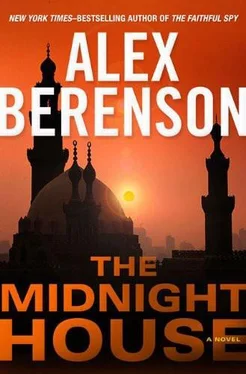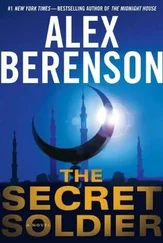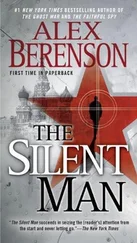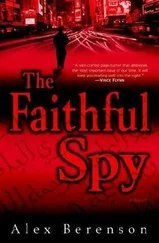Alex Berenson - The Midnight House
Здесь есть возможность читать онлайн «Alex Berenson - The Midnight House» весь текст электронной книги совершенно бесплатно (целиком полную версию без сокращений). В некоторых случаях можно слушать аудио, скачать через торрент в формате fb2 и присутствует краткое содержание. Жанр: Шпионский детектив, на английском языке. Описание произведения, (предисловие) а так же отзывы посетителей доступны на портале библиотеки ЛибКат.
- Название:The Midnight House
- Автор:
- Жанр:
- Год:неизвестен
- ISBN:нет данных
- Рейтинг книги:3 / 5. Голосов: 1
-
Избранное:Добавить в избранное
- Отзывы:
-
Ваша оценка:
- 60
- 1
- 2
- 3
- 4
- 5
The Midnight House: краткое содержание, описание и аннотация
Предлагаем к чтению аннотацию, описание, краткое содержание или предисловие (зависит от того, что написал сам автор книги «The Midnight House»). Если вы не нашли необходимую информацию о книге — напишите в комментариях, мы постараемся отыскать её.
The Midnight House — читать онлайн бесплатно полную книгу (весь текст) целиком
Ниже представлен текст книги, разбитый по страницам. Система сохранения места последней прочитанной страницы, позволяет с удобством читать онлайн бесплатно книгу «The Midnight House», без необходимости каждый раз заново искать на чём Вы остановились. Поставьте закладку, и сможете в любой момент перейти на страницу, на которой закончили чтение.
Интервал:
Закладка:
Back in the bedroom, Wells popped open his suitcases. The first was filled with jeans, khakis, polo shirts, sneakers, even a Dallas Cowboys cap. Just what the housekeepers at the Intercontinental would expect William Barber to be wearing. Wells neatly folded the clothes in his dresser and turned to the second, larger case.
It held a different culture’s clothes. One brown galabiya, the simple robe worn by many Egyptian men. Two pure white dishdashas, the more elegant robes favored by Saudis and Kuwaitis. For his feet, heavy brown leather sandals. A cell phone with a 965 prefix, the code for Kuwait City. A thick steel Rolex. No self-respecting Kuwaiti man would be caught without one. Under all the robes, an expensive Sony digital video camera and a brushed-aluminum iMac.
Wells considered a galabiya, then changed his mind and decided on a dishdasha. Then he pulled the fake passport that the agency had given him from the bag he’d carried strapped to his legs. According to the passport, he was a Kuwaiti named Nadeem Taleeb. An Egyptian visa showed that he’d entered the country at Suez, on a ferry from Jeddah, Saudi Arabia. The passport came with Saudi entry and exit stamps to support the story.
Back at Langley, Mike Merced, a talkative twentysomething who was Wells’s favorite document geek, had promised Wells that the passport would hold up to almost any inspection. “As long as you don’t try to get into Kuwait with it,” Merced said. “Though I don’t know why anyone would ever want to go to Kuwait.” Besides the passport, Merced had given Wells a wallet stuffed with Kuwaiti dinars and Saudi riyals, along with credit cards and a driver’s license in Taleeb’s name.
But Wells was missing one item that he normally would have considered essential. A weapon. He could have connected with the station here for a pistol. Instead, he was coming in dark. Not even the chief of station knew he was here. He’d chosen this course for two reasons. One was logical, one less so.
First, the Egyptian mukhabarat would have tails on all the station’s couriers. Wells preferred not to risk blowing his cover before his mission even began. More important, this mission wasn’t the kind for which a gun would help. If he wound up sticking a gun in someone’s face, he’d already failed. No, to succeed in this mission, Wells would need to become Nadeem Taleeb. And Nadeem would naturally stay as far from the CIA as possible. So Wells wanted nothing to do with the agency. Now, as Nadeem, he flicked the television to channel 7, MBC, and watched an Arabic sitcom, talking back to the screen, finding the rhythm of the language for the first time in years.
After an hour, he rose, pulled the curtains. The sun was sinking behind the city. As the heat of the day eased, Cairo came alive. On the Nile, the boats flipped on neon lights and glowed red and blue and green. Couples and families and packs of teenagers filled the sidewalks on the Tahrir Bridge, savoring the breeze that fluttered down the river. Beside them, battered black-and-white taxis and boxy green buses filled the pavement. The sun disappeared entirely, and the sky darkened. From every direction, the calls to evening prayer began, eerie amplified voices that echoed through the city.
Wells turned east, away from the river — the orientation was easy enough, since the room faced straight west to the Nile — and fell to his knees and pushed his head against the carpeted floor and prayed. As Nadeem. As a Muslim.
A HALF HOUR LATER, he walked out of the Intercontinental’s side entrance, carrying the larger suitcase. Before he could even get a hand in the air, a cab stopped.
“Salaam alekeim,” Wells said. Peace be with you. The traditional Muslim greeting.
“Alekeim salaam.”
“Lotus Hotel,” Wells said in Arabic.
“Come on, then.”
Wells slipped in.
“Where you from?”
“Kuwait.”
The driver was silent. Other Arabs often viewed Kuwaitis as arrogant. Then, as if realizing he might be missing an opportunity, the driver put a hand on Wells’s arm.
“First time to Cairo?”
“First time.”
“Tomorrow. I take you to the pyramids! Giza, Saqqara, Dahshur. All-day trip. Only two hundred fifty pounds”—about fifty dollars. “Give me your mobile number!” The driver was a bit deaf, or maybe he thought he could shout so loudly that Wells would have to agree.
“I’m here on business.”
“I drive you around Cairo, then! Very good price.”
“Maybe.”
“Definitely! ”
Wells didn’t respond, and eventually the driver dropped his arm. They fought through traffic onto Talaat Harb, a brightly lit street crowded with clothing stores, restaurants, and travel agencies. The pavement ahead opened up, and the driver gunned the gas.
As he did, a woman in a burqa stepped into the road about fifty yards ahead. With her feet hidden beneath her black robes, she looked as though she were floating over the pavement on an invisible river. A very slow river.
The driver honked furiously. Still, the woman didn’t hurry, didn’t even turn her head to look at them, as if her robes were a force field that would protect her from harm. Finally, the driver gave in and slammed his brakes. The taxi, a cheap old Fiat, pitched forward on its springs and skidded to a stop just short of the woman. She walked on.
“Women,” the driver said. “Crazy. How many wives you have?”
“Only one.”
“Hah! And you a Kuwaiti! I have three. Three wives! And ten children!” The driver smiled at Wells with teeth as yellow and battered as the Cairo skyline. “How many children you have? Two? Three?”
“Eleven,” Wells said, trying not to smile.
“Eleven?” The driver frowned. Wells wondered whether he would try to have another baby tonight, or maybe two, to retake the lead. “And only one wife? You keep her very busy! I have six boys! How many boys you have?” “None.”
“All girls and no boys! You need new wife, habibi. She wastes your time.” The driver patted Wells’s arm happily. He might not have as many children as Wells, but he had more boys, and boys were what counted.
At the hotel, the driver, still hopeful, pressed a tattered business card into Wells’s hand. “Al-Fayed Taxi and Car for Transport.”
“You call tomorrow.”
“Shokran,” Wells said.
“Ma-a-saalama.”
“Ma-a-saalama.”
THE LOTUS HOTEL was eight floors of dusty concrete. The receptionist gave a bored look at Wells’s Kuwaiti passport, took his credit card, and handed over the brass key — no programmable cards here — to room 705. The elevator was an old-school model, a metal gate on the inside. When Wells closed the gate and pushed the button for seven, it didn’t move for a while and then ascended as huffily as a smoker in a marathon. His room was narrow and dark, with a creaking three-bladed fan pushing the stale air sideways. Wells stripped off his dishdasha and lay diagonally across the sagging double bed, his feet hanging off the corner. The perpetual honking from the street should have bothered him, but instead it soothed him. He fell asleep instantly.
He woke to the sound of the morning call to prayer, showered under a surprisingly hot stream, and slipped on his galabiya, feeling its loose folds envelop him. He lifted the mattress and slid the keycard for the Intercontinental into a tiny seam in its bottom, where it would be hidden from the most thorough of searchers. He peeked out the window. The street was temporarily empty, aside from a handful of teenage boys joking with one another. They looked as though they’d stayed out all night, smoking flavored tobacco from the tall water pipes Egyptians called shisha .
Читать дальшеИнтервал:
Закладка:
Похожие книги на «The Midnight House»
Представляем Вашему вниманию похожие книги на «The Midnight House» списком для выбора. Мы отобрали схожую по названию и смыслу литературу в надежде предоставить читателям больше вариантов отыскать новые, интересные, ещё непрочитанные произведения.
Обсуждение, отзывы о книге «The Midnight House» и просто собственные мнения читателей. Оставьте ваши комментарии, напишите, что Вы думаете о произведении, его смысле или главных героях. Укажите что конкретно понравилось, а что нет, и почему Вы так считаете.












